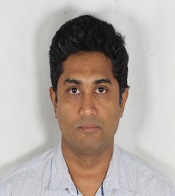


Senior Researcher
Divecha Centre for Climate Change
Indian Institute of Science,
Bengaluru-560012
Karnataka
India
Email: shoibalc@iisc.ac.in
Tel: +91-80-2293-3425
PhD,1998-2005, Princeton University, Princeton, U.S.A. Dissertation.
BTech, 1994-1998,Engineering Physics, Indian Institute of Technology, Mumbai,India.
2020-present:
Senior Researcher, Divecha Centre for Climate Change, Indian<
Institute of Science, Bangalore
2017-2020:
Fellow, Ashoka Trust for Research in Ecology and the Environment,
Bangalore
2014-2017:
Assistant Professor, National Institute of Advanced Studies, Bangalore
2013-2014:
Visiting Research Consultant, National Institute of Advanced
Studies, Bangalore
2006-2013:
Research Associate, Princeton Environmental Institute, Princeton
University, Princeton U.S.A.
1999-2005:
Teaching and Research Assistant, Princeton University, Princeton,*
USA
Energy and climate policy
Air pollution
Energy modelling
Renewable energy
Energy access
Energy and climate equity
Nominated for the Indian Council for Cultural Relations (ICCR) Visiting Professor of Indian Studies at the Chinese University of Hong Kong (CUHK), Hong Kong in 2016-17. As a part of the Visiting Professorship, I would have taught a course on environmental impacts of energy use in India and initiated a research collaboration with the Department of Geography and Resource Management, CUHK. I turned down the opportunity due to my commitment to guide my PhD students through the critical thesis proposal development and submission stage.
Cited for the co-invention of The Personal Carbon Footprint, listed in the 50 Best Inventions of 2009, compiled by Time magazine, Dec.8, 2009. This was based on “Sharing global CO2 emission reductions among one billion high emitters.”
Awarded the Princeton University Carbon Mitigation Initiative best paper award in 2010 for the paper, Sharing global CO2 emission reductions among one billion high emitters.
Demographic transition in India, Indian Statistical Institute–Centre for research on the Economics of Climate, Food, Energy and Environment (CECFEE) Annual Conference, 16-17 November, 2018, Goa.
There is no economic case for new coal plants in India, Environment for Development Initiative (EfD) Twelfth Annual Meeting, 2-5 November, 2018, Hanoi.
The cost of air pollution from coal: connecting air pollution to climate change mitigation, National Seminar on Changing Landscape and Growing Financial Crisis in the Power Sector, Centre for Financial Accountability, 1-2 September 2018, New Delhi
Social cost of power from coal and renwables in India, 9th International Conference on Climate Change, Tata Institute of Social Sciences, 10-11 August 2018, Mumbai.
Social cost of electricity from coal, World Congress of Environment and Resource Economics 2018, University of Gothenburg, 25-29 June, 2018, Gothenburg, Sweden.
Human development index distributions in India and the world, Indian Statistical Institute–Centre for research on the Economics of Climate, Food, Energy and Environment (CECFEE) Annual Conference, 17-18 November, 2017, Udaipur.
Renewables in the Indian electricity sector, Jawaharlal Nehru Centre for Advanced Scientific Research, 13th July 2016, Bangalore.
Renewables in the Indian electricity sector: how fast and how much? 5th Global Conference of the Initiative on Climate Adaptation Research and Understanding through the Social Sciences (ICARUS), June 30-July 1, 2016, Indian School of Business, Hyderabad.
The Future of the Indian electricity sector with high renewable penetration, Indian Statistical Institute–Centre for research on the Economics of Climate, Food, Energy and Environment (CECFEE) Policy Workshop, Indian Statistical Institute, Nov 2, 2015, New Delhi.
100 Gigawatts of solar by 2022: risks, systemic externalities and external factors, Workshop on ‘Is Power generation by solar cheaper than from coal?’, Indian Institute of Science and NIAS, Aug 8, 2015, Bangalore.
Energy and Climate: Is Climate Change Humanity’s Biggest Challenge? Ashoka University, March 19, 2015, New Delhi.
Open Source Energy Economy Models, Climate Science and Policy Workshop, Indian Institute of Bombay, Mar 7, 2014, Mumbai.
Open Source Modelling Tools for Energy and Climate Policy in India, Indian Institute of Delhi, Nov 26, 2012, New Delhi.
Learning Rates and the Green Energy Deployment Game, International Energy Workshop, June 19, 2012, Cape Town.
Equity and Emissions – How science informs and limits physical measures of equity, Conference on Intergenerational Equity and Climate Change, 14 June 2012, Paris.
Learning Rates, Green Energy Deployment, and Feasible Climate Agreements, 7th Annual Conference on Economic Growth and Development, Indian Statistical Institute, 15-17 Dec 2011, New Delhi.
One Billion High Emitters, Keynote address, Technology Oriented Cooperation and Strategies in India and China: Final Conference, Leuven University, Leuven 12 October 2009.
Projecting Aviation demand till 2050, International Energy Workshop, 17-19 June 2009, Venice.
One Billion High Emitters, ECN side-event, 13th session of the UNFCCC Convention subsidiary bodies – SBSTA and SBI, 1-12 June 2009, Bonn.
Clean air transitions in Indian cities Funding agency: Environment for Development (EfD), University of Gothenburg Grantees: Rohini Somanathan (PI) and Parikshit Ghosh (co-PI), Delhi School of Economics; and Shoibal Chakravarty (co-PI) Amount: SEK 330000 (INR 5) Duration: February 2019 - January 2021
Facilitating the target of 100 GW Solar by 2022 Funding agency: Ministry of New and Renewable Energy Grantees: Shoibal Chakravarty (PI) and H. K. S. Nathan (co-PI), National Institute of Advanced Studies. Amount: Rs. 19,50,000 Duration: October 2016 – July 2017
Quantitative Methods, 2017-18: Coordinator for the core course in statistics and programming in R for PhD students at ATREE.
Programming for data analysis and modelling, 2014-15: This course was offered to graduate students and research associates to teach Python, the standard scientific computing language, and to use it to teach the basics of data analysis and statistics.
Energy Systems: Technology and Policy, 2015-16: This is an introductory course covering, energy systems, climate change and policy for PhD students who intended to work in energy modelling and energy policy (co-taught with Dr. Gopi Rethinaraj, NIAS).
Reviewer for Proceedings of the National Academy of Sciences, Global Environmental Change, International Environmental Agreements: Politics, Law and Economics, Nature Geoscience and Nature Communications.
Expert reviewer for research proposals submitted under the theme “Environment (including climate change)” for the main science funding agency of the European Union, the General Directorate of Research, European Commission.
<------------------------------------------------------------------------------------------------------------->